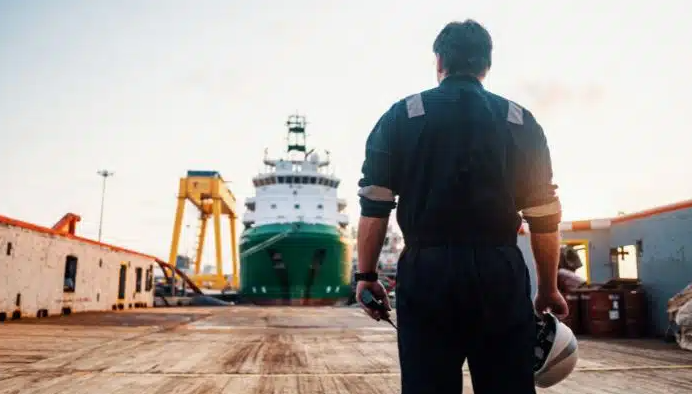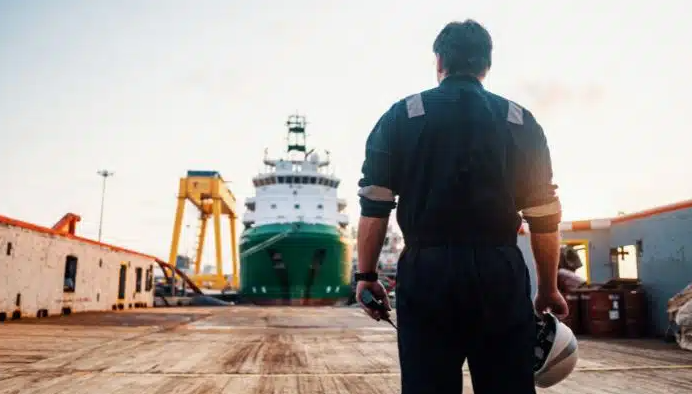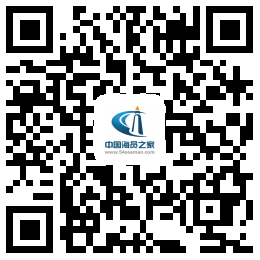ISWAN的新调查于海员日启动,旨在了解海上脱碳的快速技术变革对海员工作满意度和海上幸福感的影响。
近年来,随着海事部门开始应对气候紧急情况和航运脱碳的迫切需要,航海业经历了巨大的技术变革。海员是这一转变的核心,他们被要求迅速适应船上新技术系统的运行,并应对使用新型且往往具有潜在危险的燃料的挑战。
脱碳运动带来了巨大的挑战,即确保海员获得安全管理新技术和燃料所需的培训和技能。最近由海事公正过渡工作组委托进行的一项研究发现,到20世纪30年代中期,多达80万名海员可能需要额外培训来处理替代燃料和技术。
然而,至关重要的是,在提高海员技能和实现环境目标的迫切需要中,海员的福祉不容忽视。海事领域的快速技术变革正值海员已经面临前所未有的挑战之时:新冠肺炎疫情、船员换班危机和缺乏岸上假期都给这个原本要求很高、压力很大的职业增加了额外的压力。这些因素已经让一些海员在岸上寻找替代职业,这加剧了航运业日益严重的招聘和留用危机。
国际海员福利和援助网络(ISWAN)通过其帮助热线和区域案例工作与海员接触,担心海事部门为实现到2050年净零碳排放而正在经历的变革可能会给海员的心理健康带来额外的压力,并可能进一步损害他们的工作幸福感。
作为回应,ISWAN正在发起一项新的调查,旨在更好地了解采用新的脱碳技术和相关检查制度对海员和岸上工作人员福利的影响。除了了解技术变革对海事工作的影响——无论是积极的还是消极的——外,该调查还试图从海员和岸上工作人员那里了解航运公司和船员代理如何最好地支持他们适应快速变化的步伐。
ISWAN国际运营经理Chirag Bahri说:“今年,国际海事组织的海员日重点关注海员在保护海洋环境方面的核心作用。这一点最为明显的莫过于海员在实施海运业实现零碳所需的广泛变革方面发挥的重要作用。然而,这不能以牺牲海员的福祉为代价。
ISWAN的新调查旨在阐明航运业如何为海员提供所需的支持,以实施实现国际脱碳目标所需的技术变革。这对于确保海事行业能够招募和留住未来运营零碳全球船队所需的技术熟练和积极的进取船员至关重要。”
▲Representation Image
英文原文
Launched on the Day of the Seafarer, ISWAN’s new survey seeks to understand the impact that the rapid technological changes to decarbonise maritime are having on seafarers’ job satisfaction and wellbeing at sea.
In recent years, seafaring has undergone huge technological change, as the maritime sector begins to respond to the climate emergency and the urgent need to decarbonise shipping. Seafarers are at the heart of this transformation and are being called upon to rapidly adapt to operating new technological systems onboard and dealing with the challenges of working with new and often potentially hazardous fuels.
The drive to decarbonise brings with it the enormous challenges of ensuring that seafarers have the training and skills that they need to manage new technologies and fuels safely. A recent study commissioned by the Maritime Just Transition Task Force found that up to 800,000 seafarers could require additional training to handle alternative fuels and technologies by the mid-2030s.
It is, however, crucial that seafarers’ wellbeing is not overlooked amidst the urgent imperatives to upskill seafarers and to meet environmental targets. The rapid technological changes in maritime come at a time when seafarers have already faced unprecedented levels of challenge: the COVID-19 pandemic, the crew change crisis and the lack of shore leave have all added additional pressures to what was already a highly demanding and often stressful profession. These factors are already leaving some seafarers to seek alternative careers on shore, contributing to a growing recruitment and retention crisis in the shipping industry.
From contact with seafarers through its helplines and regional casework, the International Seafarers’ Welfare and Assistance Network (ISWAN) is concerned that the changes that the maritime sector is undergoing in order to achieve net zero carbon by 2050 could be placing additional stress on seafarers’ mental health and potentially further eroding their wellbeing at work.
In response, ISWAN is launching a new survey that seeks to better understand the impact that the adoption of new decarbonising technologies and the associated inspection regimes are having on the welfare of both seafarers and onshore staff. As well as understanding the difference – whether positive or negative – that technological change is making to working in maritime, the survey also seeks to gain insight from seafarers and shore-based staff into how shipping companies and crewing agents can best support them to adapt to the rapid pace of change.
Chirag Bahri, ISWAN’s International Operations Manager, said: ‘This year, IMO’s Day of the Seafarer focuses on seafarers’ central role in protecting the marine environment. Nowhere is this more apparent than in the vital role seafarers play in implementing the wide-reaching changes that will be needed for the maritime industry to reach zero carbon. However, this cannot be at the expense of seafarers’ wellbeing.
ISWAN’s new survey aims to shed light on how the shipping industry can give seafarers the support they need to put into practice the technological changes that will be needed to meet international decarbonisation goals. This will be crucial in ensuring that the maritime industry can recruit and retain the skilled and motivated crew that they will need to operate the zero-carbon global fleet of the future.’
ISWAN’s survey can be accessed here, and is open to all seafarers and shore-based staff.
免责申明:本文来自网络,如有误差,以英文为准;仅代表作者观点,不代表中国海员之家立场。其真实性及原创性未能得到中国海员之家证实,在此感谢原作者的辛苦创作,如转载涉及版权等问题,请作者与我们联系,我们将在第一时间处理,谢谢!联系邮箱:cnisu@54seaman.com


 联系我们人工客服
联系我们人工客服



















 :1391995811
:1391995811


评论 (0人参与)